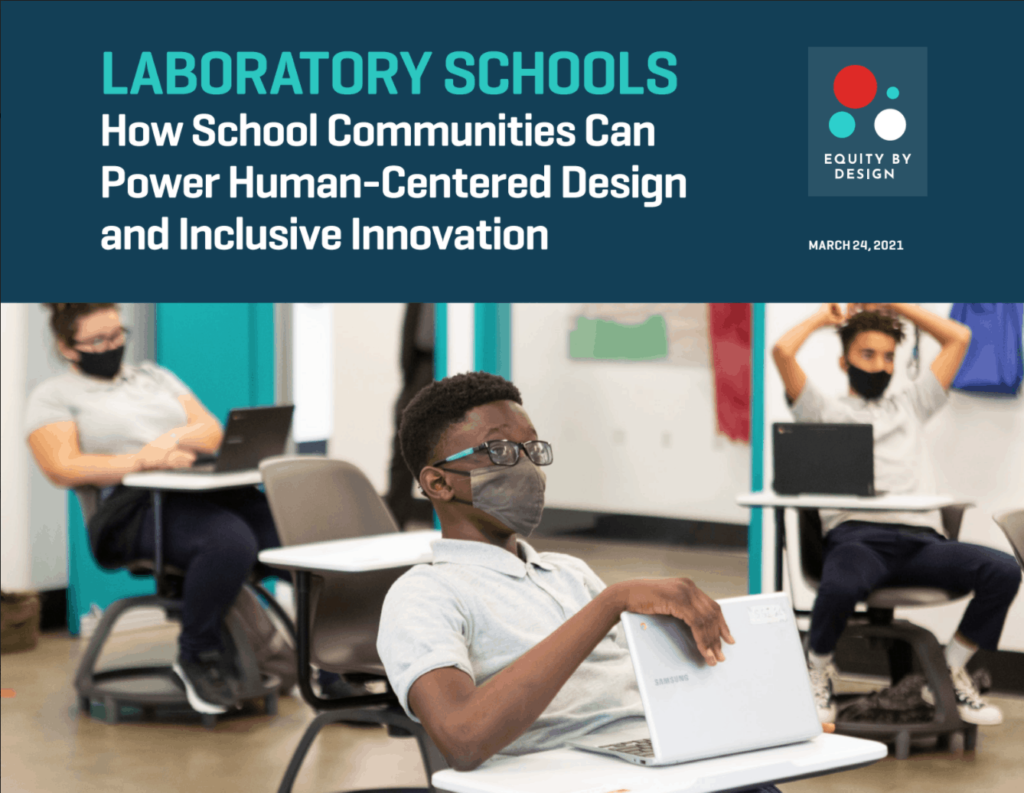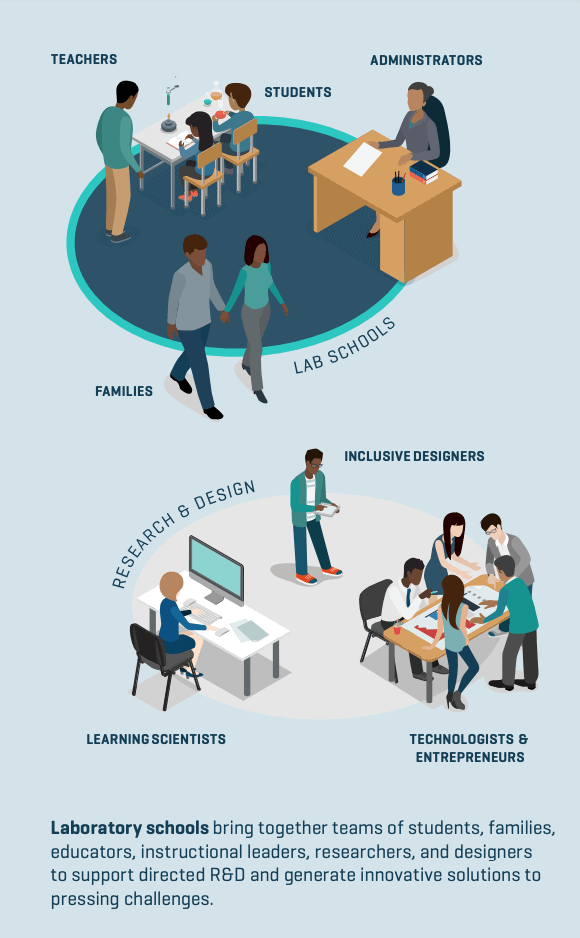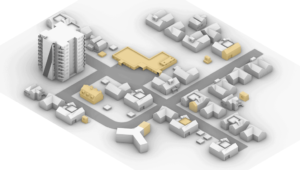Meeting the Challenge of Reopening: How Laboratory School Communities Can Power Human-Centered Design and Inclusive Innovation

On March 24, 2021, the United States Department of Education convened a National Safe School Reopening Summit. Getting schools open safely, and then reimagining how schools can meet the challenges of this moment represents the most significant opportunity in our generation to advance equity and excellence.
Where will leadership to do this come from? One answer is from laboratory schools. These schools—and other schools that employ laboratory school practices—are skilled at developing, modifying, iterating upon, and validating solutions to pressing challenges. Laboratory schools have long been lighthouses illuminating a pathway to innovation in education. School communities have often been at the forefront of developing evidence-based solutions, and it’s time to roll out their approaches more widely across America’s public school system.
Almost a decade ago, we heard the clarion call for change in our neighborhood in downtown Brooklyn. When we founded Brooklyn Lab, we did so with an eye not just to make a difference in our community but to model a new approach to education for students in communities around the country. And while we have made mistakes, had hypotheses proven wrong, and stumbled through obstacles, our founding vision remains as relevant today as it was seven years ago: to build a school that would iterate rapidly, engage families actively, challenge the status quo, and demand equity for all students. EquityByDesign is sharing resources and lessons learned in a new resource, LABORATORY SCHOOLS: How School Communities Can Power Human-Centered Design and Inclusive Innovation
Across the country, the COVID-19 pandemic has ignited the transformation of education. Almost overnight, the country became a test bed as schools experimented with new ways to deliver education to our nation’s 53 million K-12 students. One year in, it’s clear that our shared response to the pandemic has had both bright spots and challenges. Ultimately, the pandemic has exacerbated our education system’s existing inequities and shined the light on decades of systemic racism and institutional oppression. The opportunity gap has widened even further for our most vulnerable students—and that should be a wake-up call that we need to make change as we make way for the reopening of school doors.
Despite the admirable efforts of educators and school administrators, these experiments have failed many students—particularly students who are low-income; Black, Indigenous, and people of color (BIPOC); learning English; or living with a disability. That’s because most of our nation’s schools lack the infrastructure that laboratory schools have for piloting solutions. They don’t have license to make—and learn from—mistakes. Rather, improvements in traditional education are mediated through slow-moving systems and blunt instruments intended to work for “average students” while those on the margins fall through the gaps.
Unfortunately, most schools don’t have the tools to fix these real issues because most investments in education research and development (R&D) are concentrated in later-stage functions like randomized experimentation and validation, which happen outside of the K–12 school setting. It can take years before the most significant developments in learning sciences and design are applied in classrooms. R&D methodologies that are removed from real classrooms often lack the insights and lived experiences of the people within school communities. Laboratory schools, on the other hand, are engines of rapid-cycle innovation and experimentation: we advance what works for students and families and quickly discard what doesn’t.
During the pandemic, American public schools have not had the luxury of waiting for solutions that meet the needs of their students, families, and staff. They needed immediate evidence-based solutions to immediate challenges, and they still do.
Laboratory schools, including ours, have stepped in to build research-backed solutions. These schools, which comprise a small but robust network, are designed to innovate and diversify educational practices and policies. During the pandemic, laboratory schools have served as centers of applied education R&D that are embedded within—and shaped by—local communities. They demonstrate the essential role individual school communities can play in designing and adapting solutions to education’s systemic challenges. They are illuminating a path toward a better future.
To expand this impact, our country must deepen its investment in laboratory schools and their approaches.
Our new guide aims to increase awareness of the role for laboratory schools in reimagining the future of education. It also gives educators the tools they need to apply laboratory schools practices, methodologies, and insights that can deliver these benefits to more school communities. In pulling insights from our experience as a laboratory school, Brooklyn LAB has created a suite of actionable resources that any motivated school leaders can use to generate and modify relevant, evidence-based solutions to longstanding problems that have been exacerbated by the pandemic.
 The strategies and broader conceptual recommendations described in this guide can help schools equitably engage students, families, educators, and experts to ensure that solutions meet real needs. This guide offers numerous examples, but it does not aim to be prescriptive, nor are the insights exhaustive. Rather, as schools explore a laboratory-school approach to problem-solving, we invite them to regularly reference and return to this guide as they adapt certain high-leverage strategies to meet the unique needs of their communities.
The strategies and broader conceptual recommendations described in this guide can help schools equitably engage students, families, educators, and experts to ensure that solutions meet real needs. This guide offers numerous examples, but it does not aim to be prescriptive, nor are the insights exhaustive. Rather, as schools explore a laboratory-school approach to problem-solving, we invite them to regularly reference and return to this guide as they adapt certain high-leverage strategies to meet the unique needs of their communities.
This guide can also be a resource for those working to build standing infrastructure for applied education R&D, including federal policymakers, researchers, and philanthropists, as they consider how to best advance actionable knowledge within the U.S. educational landscape. We hope these stakeholders use this guide to deepen their understanding of the laboratory-school approach to creative problem-solving and the great potential it has to help promote necessary, systemwide improvements.
We are excited to share the work led by Brooklyn LAB through the EquityByDesign.org initiative, and hope others are encouraged to try these approaches during the pandemic and into the future.
For more see:
- How to Reopen Schools: A 10-Point Plan Putting Equity at the Center
- To Reopen, America Needs Laboratory Schools
- How Schools Can Promote Vaccination and Address Hesitancy: A 10-Point Plan that Puts Equity First
- Preparing to Reopen: Six Principles That Put Equity at the Core
- Reopening Schools: A Scheduling Map for Educators to Plan the Who, What, When, Where, and How of Learning this Fall
- How We Move Forward: Practicing Three Inclusive, Anti-Racist Mindsets for Reopening Schools
- Schools Need a Success Coach for Every Learner
- How Schools Can Help Cultivate Learner Identity and Agency
- Preparing for a Healthy and Safe Return to School: Public School Facilities Planning in the Era of COVID-19
- Educating All Learners Alliance Launches Flagship Site, Shares Personas Educators Can Use to Understand Students’ Lived Experience During COVID-19
- Five Principles to Help Provide Our School Communities With the Communications They Deserve
Stay in-the-know with innovations in learning by signing up for the weekly Smart Update.







0 Comments
Leave a Comment
Your email address will not be published. All fields are required.